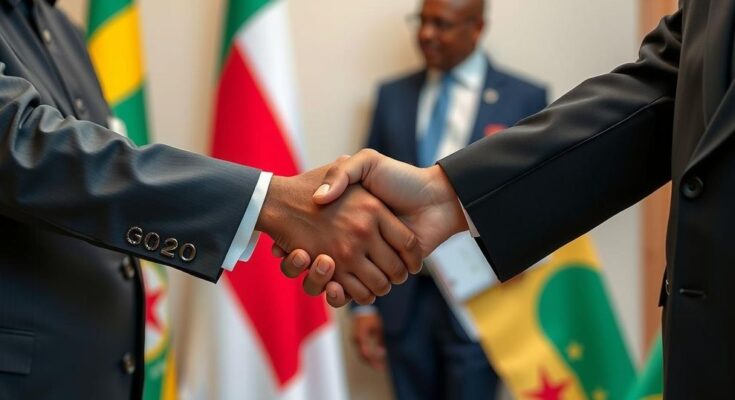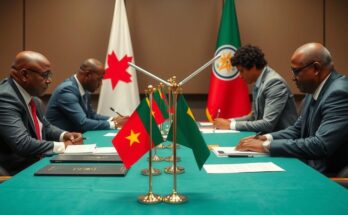Somalia and Ethiopia have restored diplomatic ties after a significant visit from Somali President Hassan Sheikh Mohamud. Türkiye’s mediation facilitated this agreement, leading to the Ethiopia-Somalia Ankara Declaration aimed at fostering cooperation. The two nations seek to improve trade and collaborate on security issues, particularly against groups like al-Shabaab, following a year of strained relations caused by Ethiopia’s agreements with Somaliland.
Somalia and Ethiopia have formally announced the reinstatement of diplomatic relations following a significant diplomatic mission by Somali President Hassan Sheikh Mohamud to Addis Ababa. This reconciliation concludes a year-long diplomatic strain exacerbated by regional tensions. Türkiye has been instrumental in facilitating this dialogue, hosting multiple negotiation sessions that culminated in the Ethiopia-Somalia Ankara Declaration, which aims to foster improved cooperation between the two nations.
The Ankara Declaration, celebrated by the African Union, the United States, and the European Union, sets forth a timeline for technical negotiations to commence by the end of February 2025, with an objective to conclude these discussions within four months. Both President Mohamud and Ethiopian Prime Minister Abiy Ahmed underscored their commitment to transcending historical differences, aspiring toward a partnership characterized by “friendship and solidarity,” with particular focus on enhancing trade and security collaboration to combat extremist threats, notably from al-Shabaab.
This rapprochement follows a period of discord triggered by an Ethiopia-Somaliland agreement concerning sea access, which had resulted in Somalia expelling Ethiopia’s ambassador in April 2024. Although the details surrounding Ethiopia’s maritime access and the recognition of Somaliland’s autonomy remain ambiguous, the regional landscape is shifting, as evidenced by meetings between Somalia’s Foreign Minister and officials from Egypt and Eritrea, who oppose foreign military presence in the Red Sea.
Additionally, the presence of Egyptian troops under the African Union Support and Stabilisation Mission in Somalia reflects ongoing cooperative efforts to address the insurgency challenges facing the nation. The resumption of diplomatic ties between Somalia and Ethiopia, mediated by Türkiye, suggests a move towards regional stability, amidst the complexities inherent in international and geopolitical dynamics concerning maritime and security matters.
The restoration of diplomatic relations between Somalia and Ethiopia comes after a protracted period of tension rooted in the geopolitical landscape of the Horn of Africa. Historically, relationships in this region have fluctuated, influenced by border disputes, conflicting territorial ambitions, and shifting alliances. The role of Türkiye as a mediator highlights its growing influence in Africa, offering diplomatic solutions that underscore the need for collaboration in addressing shared security threats. The dynamics between Somalia, Ethiopia, and entities like Somaliland continue to evolve, signifying the importance of understanding regional interactions.
The recent restoration of diplomatic ties between Somalia and Ethiopia represents a pivotal shift in the Horn of Africa, facilitated by Türkiye’s mediation efforts. The Ankara Declaration lays a foundation for future cooperation on various fronts, particularly in trade and security. However, the complexities surrounding maritime access, regional alliances, and the fight against extremism will require ongoing commitment and dialogue from all involved parties to sustain long-term stability.
Original Source: ilkha.com




